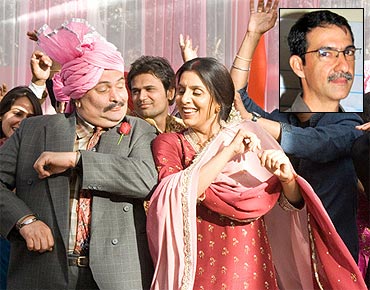
One of last year's most interesting success stories was that of Habib Faisal, who, with two lovely films, established himself as one of the most authentic and original writers in Bollywood. Faisal wrote and made his directorial debut with the very well-received Do Dooni Chaar, and then helped us end the year on a high by writing the fantastic blockbuster Band Baaja Baarat.
In a conversation with Raja Sen, Faisal discussed how much of his own history lies in his projects, the flavour that can be derived from a city like Delhi, and why a formulaic rom-com isn't necessarily a bad thing. Excerpts:
Where was Do Dooni Chaar born, and how much of it is personal?
Oh, Do Dooni Chaar was a very personal project. I read a Times Of India article on the euphoria about the Nano, a car within the reach of the lower middle class. So I had this basic germ of an idea of a family's journey from a two-wheeler to a four-wheeler over breakfast itself; then I started thinking about how to tell it.
There was a lot of personal nostalgia as I looked back on our first car, a second-hand Fiat. It was during the Sam Pitroda days, when even having a telephone was considered a luxury.
What about the teaching backdrop? It was fascinating to see an educator struggle to make ends meet. What made you opt for a teacher as protagonist?
My dad moved from Bhopal to Delhi and was with the NCERT, going from being a lecturer to a reader to a professor. The excitement was in reliving the times we had, when we three kids and mum would try and get by on a teacher's salary. He wasn't a maths teacher in a school, but I think it was close enough.
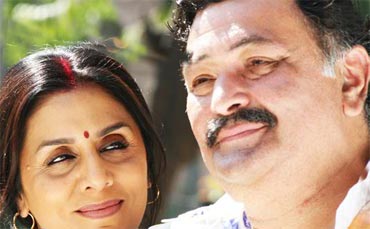
So were there real-life incidents mirrored in the film?
Sure. Like checking answer sheets to supplement income. I still remember that, for 12th class results, he'd get Rs 12 for each paper. And when the answer sheets would come home every year after the boards, especially after the 10th boards, we'd get excited about the extra money coming in. But dad taught History, so we couldn't help him check the answer sheets.
Did any student ever blatantly offer your father money via a desperate scribble in the papers itself, like the boy from the film?
(Laughs) No, never quite *that* note. But there were definitely a lot of requests. 'Sir please, pass kar do,' all that stuff. A lot.
How much do you think Delhi matters to Do Dooni Chaar? Is it a Delhi film simply because you lived there and were familiar with it?
If you know it, then why not use that space? Unlike the films of Dibakar Banerjee, and I'm not being judgmental here, where the quirk of the space and idiosyncrasy was foregrounded, for me it was all about characters and language. There's a lot of Delhi in the film but I didn't want the city to steal from the characters.
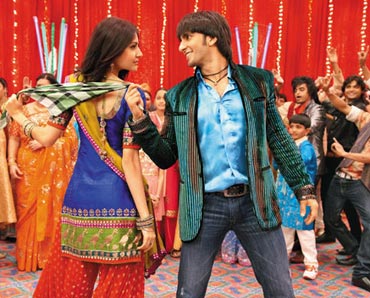
And then came Band Baaja Baarat, another Delhi film. How exactly did that come about?
Oh, Maneesh Sharma and I have interestingly paralleling backgrounds. I was from HansRaj, he was from Kirori Mal (both Delhi University colleges), and we both found our way from theatre to Yash Raj Films. Except I took the writing route and he came in as an assistant director. Band Baaja Baarat was his idea; he really wanted to do something with Delhi.
In a progressive film about ambition and romance, what made you guys look at wedding planning?
That whole 'pyaar and vyapaar' thing was quite a hook, really. It is a film about the aspirations of today. I look at BBB's heroine as an extension of Duggal's daughter from DDC, about her growing up and falling in love. Though I do admit Shruti (from BBB) is a lot more sorted than Payal (from DDC).
What do you think it is about the capital that works so well as a backdrop for these very different middle-class stories? Is it just texture, or is there more to it?
Well, while they aren't Delhi films by design, I think it's interesting to explore the transition away from Lutyen's Delhi, and see how the city is in flux with flyovers and malls coming up everywhere. And then I personally really enjoy exploring the language by which I mean avoiding the Bollywood Punjabi stereotype, adding a 'ji' to every word.
A lot of our cinema uses accents and dialects for humour and not for depth, or complexity.
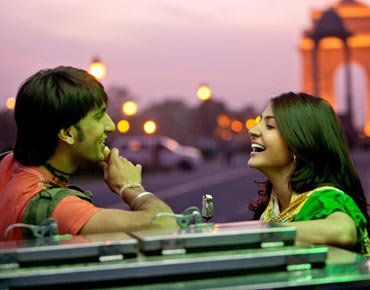
Yes, which is why I'm a particular fan of how Bittoo in Band Baaja Baraat uses the word 'mauj' to define his understanding of love, which really sums it all up wonderfully. Now, coming specifically to that character, I love how he freaks out but why does he? Does he suddenly value the job over the girl despite his initial attraction, or was he never serious about her?
It's the kind of person he is. You have to remember that he is taking that pyaar-vyapaar pact very literally. And he doesn't know what to do with the fact that pyaar has come to him in sexual form.
True, and he values Shruti beyond just attraction. She's given him a sense of self-worth.
Exactly. He was a drifter. There's that whole bit about how his father never appreciated him.
And then here's this girl who has made him discover that he can be really good at something. So there is a value he can proudly put on the vyapaar part of it, and it's not something he can throw away.
Which is why he's so flummoxed by the tu turning into the tum.
Yeah, he just doesn't know what to do about it.
It's nothing more than the awkwardness of a lover's tiff. There's nothing huge there, it's just two fairly young people being unable to express themselves.
Romantic comedies demand a conflict, but while this film touches on the aspirations of the youth, where we stand and the hollowness of India Shining, the idea wasn't to turn it into something big. The conflict is just a jhagra.
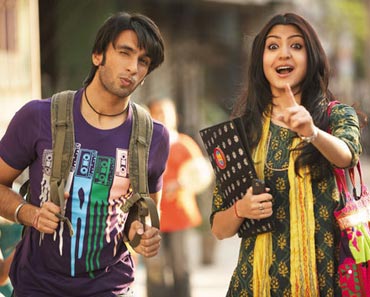
Do you feel the formulaic romantic comedy structure, and its need to centre around an eventual conflict, robs it of a narrative flow that might be truer to its characters?
Certainly it could, but I for one don't think formula is always a bad thing.
Look, formulaic romantic comedy allows you the access to a simple, unsophisticated audience who just want to enjoy. Their only demand is that we give them an interesting space.
And as for the whole 'conflict' thing, the problem with a lot of our films is that over the last years we've been borrowing conflicts which doesn't work.
In a recent interview, you've spoken of the need to make things dhinchak, and about how that is what today's audience really wants. Tell us a bit more here.
I just think we have our cliches, and instead of trying to break away from them entirely, we can use them with totally different twists. You know, there's that line about how there are only that many stories in all the world, or in The Bible, or Shakespeare.
For example, Abhinav Kashyap took the cliche of a revenge saga and dhinchak'd it by taking a Salman Khan where someone would normally have cast, say, an Irrfan. So the audience reacts to it differently.
I think this is actually something where TV has led the way, where it's exposed the small-town, the middle-class, the lower-middle class, to traditional tropes with that dhinchak twist. And it's worked!
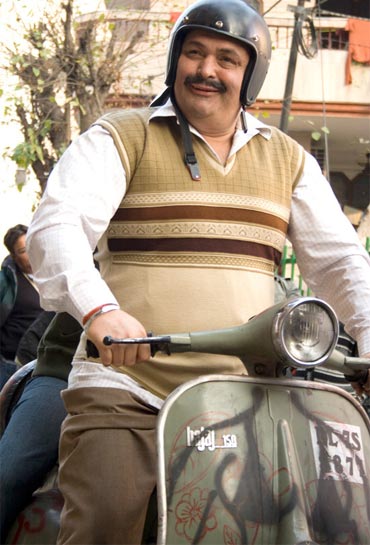
So then do you mean there should be a touch of bling where you don't expect it, or is, say, the unconventional use of dialogue in DDC also what you'd call Dhinchak?
Oh, definitely. Rishi Kapoor talking about a Mercedes and saying "Ambassador mein hi marwa de," meeting the mithaiwallahs in a McDonalds, Bittoo calling his one-night tryst a Kaand I'd say that's all Dhinchak.
Got it. And that kaand bit was just brilliant, by the way. Finally, about DDC, I must ask what made you cast Rishi and Neetu Kapoor in the lead roles, because they really aren't the first names that comes to mind.
Because casting two National School of Drama actors would have killed the film. (Laughs)
Seriously, it's a film set in Jangpura, and we wanted to do some wacko casting. And Rishi Kapoor also because I wanted to look for someone closest to my dad. Physically, dad's a golu-molu man, and the only person who worked in my head was Rishi Kapoor. And we thought if this middle-class film gets a star like him that could create genuine interest about the film. And he was just fantastic in the film.